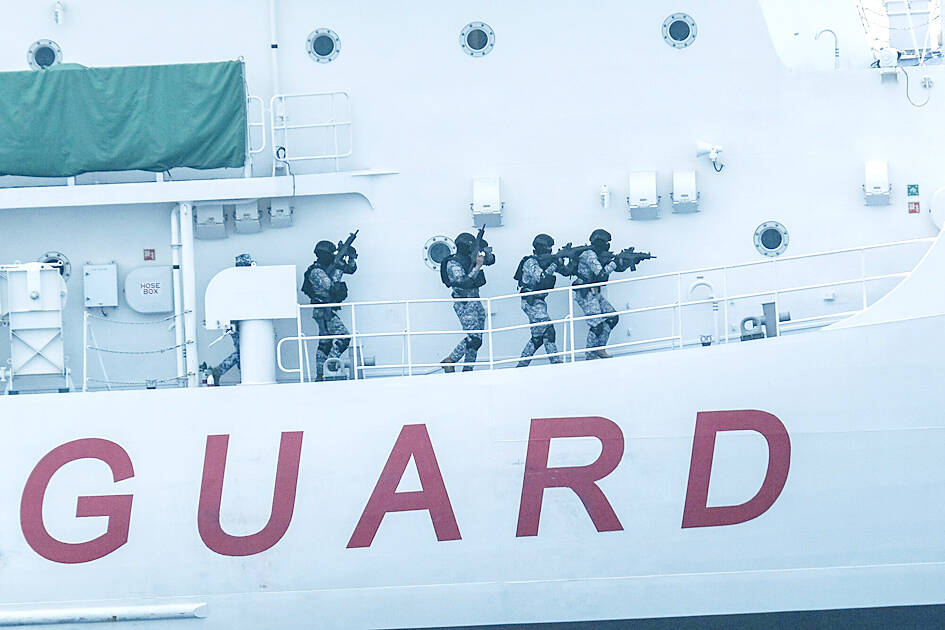China’s largest naval training ship sailed for the Philippines yesterday, its last stop of a regional “friendly” tour, amid growing unease over Chinese maritime activities in the South China Sea.
The giant training vessel, Qi Jiguang, bigger than a typical destroyer, left Brunei on Thursday for the Philippines as part of a 40-day trip, which has included stops in Vietnam and Thailand.
At the end of its trip, Qi Jiguang and its crew of 476 navy students and officers would have passed through the Yellow Sea, East China Sea, South China Sea, Gulf of Thailand and Western Pacific.

Photo: Bloomberg
‘FRIENDLY’
Training conducted by the ship, named after a Ming Dynasty general who fought against Japanese pirates, would focus on navigation, anti-piracy and shooting exercises with lightweight weapons, Chinese state media reported, describing its passage in the region as “friendly.”
Its arrival in the Philippines comes amid tensions with its neighbors over the South China Sea, which China mostly claims, but parts of which are also claimed by Taiwan, Brunei, Malaysia, the Philippines and Vietnam.
The visit also comes immediately after the first-ever trilateral coast guard exercise involving the Philippines, Japan and the US that ended on Wednesday.
The Philippines has strengthened its military ties with the US this year, conducting more drills and allowing US access to local military bases.
China was angered when Manila said the access would be useful if Chinese forces attacked Taiwan.
MARITIME CHALLENGE
Heightening tensions, the Philippines last month placed navigational buoys in the contested Spratly Islands in the South China Sea, prompting China to do the same.
From May 23 to 25, the training vessel made port in Vietnam, overlapping with the sailing of a Chinese research ship in Vietnam’s exclusive economic zone from May 7 to Tuesday.
The presence of the research ship prompted a rare protest from Hanoi.
The 10-member ASEAN is to hold its first-ever multilateral military drill in the South China Sea in September, its chair Indonesia said on Thursday.

Seven people sustained mostly minor injuries in an airplane fire in South Korea, authorities said yesterday, with local media suggesting the blaze might have been caused by a portable battery stored in the overhead bin. The Air Busan plane, an Airbus A321, was set to fly to Hong Kong from Gimhae International Airport in southeastern Busan, but caught fire in the rear section on Tuesday night, the South Korean Ministry of Land, Infrastructure and Transport said. A total of 169 passengers and seven flight attendants and staff were evacuated down inflatable slides, it said. Authorities initially reported three injuries, but revised the number

‘BALD-FACED LIE’: The woman is accused of administering non-prescribed drugs to the one-year-old and filmed the toddler’s distress to solicit donations online A social media influencer accused of filming the torture of her baby to gain money allegedly manufactured symptoms causing the toddler to have brain surgery, a magistrate has heard. The 34-year-old Queensland woman is charged with torturing an infant and posting videos of the little girl online to build a social media following and solicit donations. A decision on her bail application in a Brisbane court was yesterday postponed after the magistrate opted to take more time before making a decision in an effort “not to be overwhelmed” by the nature of allegations “so offensive to right-thinking people.” The Sunshine Coast woman —

BORDER SERVICES: With the US-funded International Rescue Committee telling clinics to shut by tomorrow, Burmese refugees face sudden discharge from Thai hospitals Healthcare centers serving tens of thousands of refugees on the Thai-Myanmar border have been ordered shut after US President Donald Trump froze most foreign aid last week, forcing Thai officials to transport the sickest patients to other facilities. The International Rescue Committee (IRC), which funds the clinics with US support, told the facilities to shut by tomorrow, a local official and two camp committee members said. The IRC did not respond to a request for comment. Trump last week paused development assistance from the US Agency for International Development for 90 days to assess compatibility with his “America First” policy. The freeze has thrown
TESTING BAN: Satellite photos show a facility in the Chinese city of Mianyang that could aid nuclear weapons design and power generation, a US researcher said China appears to be building a large laser-ignited fusion research center in the southwestern city of Mianyang, experts at two analytical organizations said, a development that could aid nuclear weapons design and work exploring power generation. Satellite photos show four outlying “arms” that would house laser bays, and a central experiment bay that would hold a target chamber containing hydrogen isotopes the powerful lasers would fuse together, producing energy, said Decker Eveleth, a researcher at US-based independent research organization CNA Corp. It is a similar layout to the US$3.5 billion US National Ignition Facility (NIF) in northern California, which in 2022 generated